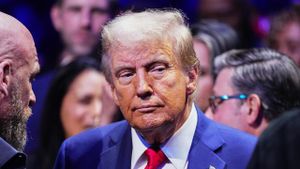The emergence of China’s DeepSeek platform has sent shockwaves through the U.S. technology sector, reminiscent of how the Soviet Union's launch of Sputnik galvanized American innovation and investment. On January 20, 2025, the same day Donald Trump was sworn in for his second term as President, DeepSeek went public, marking what many analysts interpret as China's bold strategic move aimed at establishing dominance in artificial intelligence.
DeepSeek’s launch has been described as 'calculated' by various commentators, indicating not just the importance of AI technology but the geopolitical rebuff it presents to the United States. Amid the tensions and competition between the two nations, it has become clear to observers and critics alike; America's standing as the predominant force in AI technologies could be under serious threat.
According to reports from Medium, "AI could be going through another Sputnik-type event," underscoring fears within U.S. tech circles about potential shifts in the AI arms race. This new platform, backed by the Chinese government, suggests Beijing's ambition to lead globally, compelling American tech giants and the federal government to reconsider their strategies. With noted figures such as Facebook’s Mark Zuckerberg, Google’s Sundar Pichai, and Amazon’s Jeff Bezos present at the inauguration, the launch of DeepSeek has become the focal point of discussions on the urgency for U.S.-based innovations.
DeepSeek leverages advanced machine-learning technologies and applications poised to redefine several industries, including healthcare, automotive, and telecommunications. The platform's capabilities remain somewhat shrouded, echoing China's often-secretive approach to technology. Many experts now worry about the 'network effects' stemming from Chinese innovations: as DeepSeek integrates and evolves, it could rapidly outpace its competitors, especially if American companies linger without decisive action.
The timing of DeepSeek's launch feels no accident, aiming to coincide with Trump's inauguration, which itself signals broader intentions for the U.S. as it navigates its technological future. Trump's administration had consistently emphasized the necessity for the U.S. to remain at the forefront of AI research and development. Anticipation grows over how the arrival of DeepSeek will influence U.S. policies and whether it will stir Congress to implement measures for bolstering American technological supremacy.
Despite the competitive climate, it appears there is also acknowledgment of the current U.S. AI foundation which boasts leading figures and institutions. This sector comprises not just internet giants but also numerous startups dedicated to innovation. Yet, the mere existence of DeepSeek as China's major platform introduces complications. The question remains: how will the U.S. respond to this challenge?
Experts note, the stakes couldn't be higher; as President Trump declares, "The United States isn’t going to lose the AI race," it reflects the high-pressure environment under which American companies and government officials now operate. With both Western and Eastern nations racing for leadership, many argue this should serve as motivation rather than panic. Trump’s rhetoric showcases both optimism and caution as he reiterates the importance of maintaining competitive advantages.
Moving forward, dialogues around AI ethics and regulations will likely escalate as DeepSeek's capabilities become more broadly understood. There is hope for constructive conversations on international AI standards and responsibilities, potentially recalibrated by the emergence of such competitors. The evolution of policies around privacy, security, data sharing, and more could change significantly, as both nations gauge the other's intentions and progress.
This new chapter has ignited debates about the future; the tech community is now bracing for what many believe could be transformative changes within the AI sphere. Concerns, predictions, and analysis swirl, all underscoring how serious the U.S. regards DeepSeek’s emergence.
What’s clear is the competitive dynamics between the U.S. and China within AI are intensifying, leaving observers to ponder the long-term ramifications. Analysts are closely monitoring how both nations will maneuver through these treacherous waters, especially as innovations like DeepSeek emerge from China's strategic arsenal.
The embrace of AI by China through platforms like DeepSeek symbolizes not just technological advancements but also geopolitical strategy, positioning the nation well against its rivals. Meanwhile, the U.S. may need to introspect and consolidate its assets if it wishes to reclaim its status as the leader on the global tech stage.



